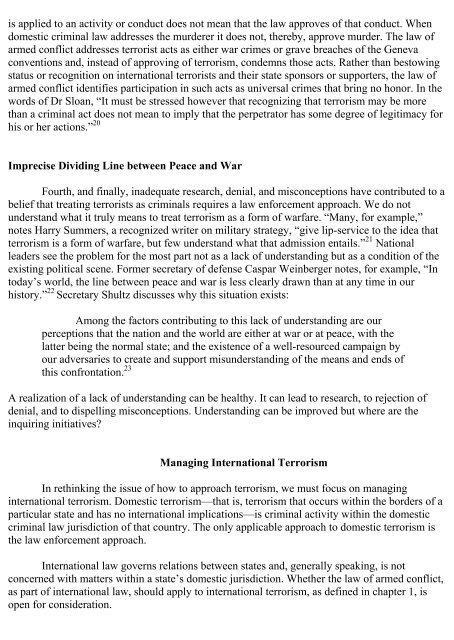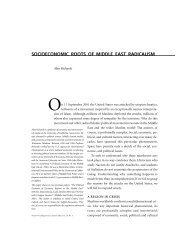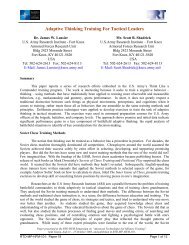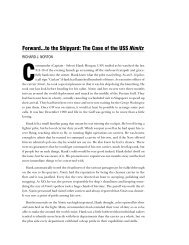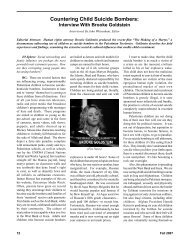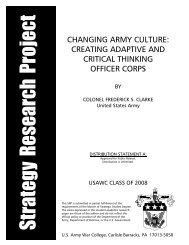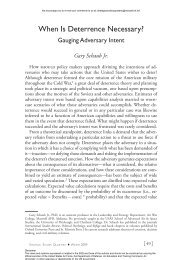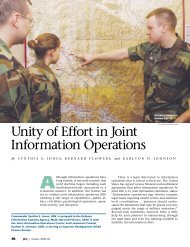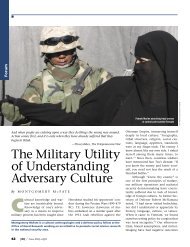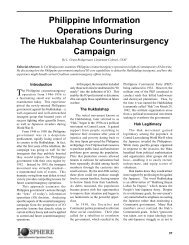Legitimate use of military force against state-sponsored - Air University
Legitimate use of military force against state-sponsored - Air University
Legitimate use of military force against state-sponsored - Air University
You also want an ePaper? Increase the reach of your titles
YUMPU automatically turns print PDFs into web optimized ePapers that Google loves.
is applied to an activity or conduct does not mean that the law approves <strong>of</strong> that conduct. When<br />
domestic criminal law addresses the murderer it does not, thereby, approve murder. The law <strong>of</strong><br />
armed conflict addresses terrorist acts as either war crimes or grave breaches <strong>of</strong> the Geneva<br />
conventions and, instead <strong>of</strong> approving <strong>of</strong> terrorism, condemns those acts. Rather than bestowing<br />
status or recognition on international terrorists and their <strong>state</strong> sponsors or supporters, the law <strong>of</strong><br />
armed conflict identifies participation in such acts as universal crimes that bring no honor. In the<br />
words <strong>of</strong> Dr Sloan, “It must be stressed however that recognizing that terrorism may be more<br />
than a criminal act does not mean to imply that the perpetrator has some degree <strong>of</strong> legitimacy for<br />
his or her actions.” 20<br />
Imprecise Dividing Line between Peace and War<br />
Fourth, and finally, inadequate research, denial, and misconceptions have contributed to a<br />
belief that treating terrorists as criminals requires a law en<strong>force</strong>ment approach. We do not<br />
understand what it truly means to treat terrorism as a form <strong>of</strong> warfare. “Many, for example,”<br />
notes Harry Summers, a recognized writer on <strong>military</strong> strategy, “give lip-service to the idea that<br />
terrorism is a form <strong>of</strong> warfare, but few understand what that admission entails.” 21 National<br />
leaders see the problem for the most part not as a lack <strong>of</strong> understanding but as a condition <strong>of</strong> the<br />
existing political scene. Former secretary <strong>of</strong> defense Caspar Weinberger notes, for example, “In<br />
today’s world, the line between peace and war is less clearly drawn than at any time in our<br />
history.” 22 Secretary Shultz discusses why this situation exists:<br />
Among the factors contributing to this lack <strong>of</strong> understanding are our<br />
perceptions that the nation and the world are either at war or at peace, with the<br />
latter being the normal <strong>state</strong>; and the existence <strong>of</strong> a well-resourced campaign by<br />
our adversaries to create and support misunderstanding <strong>of</strong> the means and ends <strong>of</strong><br />
this confrontation. 23<br />
A realization <strong>of</strong> a lack <strong>of</strong> understanding can be healthy. It can lead to research, to rejection <strong>of</strong><br />
denial, and to dispelling misconceptions. Understanding can be improved but where are the<br />
inquiring initiatives?<br />
Managing International Terrorism<br />
In rethinking the issue <strong>of</strong> how to approach terrorism, we must focus on managing<br />
international terrorism. Domestic terrorism—that is, terrorism that occurs within the borders <strong>of</strong> a<br />
particular <strong>state</strong> and has no international implications—is criminal activity within the domestic<br />
criminal law jurisdiction <strong>of</strong> that country. The only applicable approach to domestic terrorism is<br />
the law en<strong>force</strong>ment approach.<br />
International law governs relations between <strong>state</strong>s and, generally speaking, is not<br />
concerned with matters within a <strong>state</strong>’s domestic jurisdiction. Whether the law <strong>of</strong> armed conflict,<br />
as part <strong>of</strong> international law, should apply to international terrorism, as defined in chapter 1, is<br />
open for consideration.


